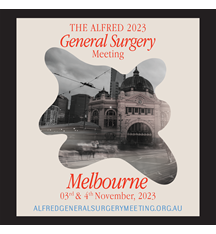2023 | Volume 24 | Issue 4

I have been in the role of president for about 11 weeks, and for much of this time, I have focused almost all my efforts on getting the organisation back on a firmer financial and governance footing.
I am pleased to announce that we are on track to return core operations to a more positive position, thanks to the various measures we have diligently implemented. Over the past five weeks, we have been steadfast in our efforts to strengthen the College’s fiscal health and navigate through challenging times.
I am pleased to announce that measures have been put in place to assist in reducing the large deficit expected in 2023 and we are on track to return core operations to a more positive position in 2024.
We have successfully secured financing to allow us to improve business operations and drive productivity to improve services to Fellows, Trainees and Specialist International Medical Graduates (SIMGs).
As some you may know, we set up a recovery committee to oversee the immediate task of providing oversight for the recovery response.
In my third week of office, we appointed Dr Tony Sherbon as a special advisor with the powers of a chief executive officer to lead the operations and restructure of the College. Tony has decades of experience in both public and private health sectors.
The Council has delegated their authority to the Executive of Council, and a skills-based Recovery Committee (RC) has been formed. In the short term, the RC advises and strategises to restore the College to a positive cash flow. In the mid to longer term, it will guide the pathway to ongoing financial sustainability.
The RC consists of the president, vice president, special advisor, and four skilled members:
- Shane Solomon: An experienced health executive, consultant, digital strategy expert, and non-executive director board member.
- Souella Cumming: A national industry leader in the Aotearoa New Zealand government and public sector, and a partner at KPMG's Advisory practice for 43 years.
- Nic Carr: With a law and economics degree, he brings 20 years of experience in managing professional service businesses as an executive managing director and non-executive director. He also lectures for Australian Institute of Company Directors on board roles, director duties, responsibilities, finance, risk, and strategy.
- John Craven: A highly experienced director on ASX listed boards with expertise in cyber and digital systems.
Their valuable expertise and generous assistance are greatly appreciated.
In this current environment, we are also reviewing the 1 College Transformation digital transformation program, scope, and headcount. While there are critical areas that require immediate investment in order to deliver core functions and membership value, it is necessary to ensure that the expenditure is purposefully directed, efficiently allocated and carefully monitored.
To reduce costs further, we have identified key areas for review in procurement, such as security, facilities management, travel, accommodation, venue hire, licenses, catering, and recruitment.
As communicated recently, our chief executive officer, John Biviano, stepped down from his role to pursue other opportunities. We wish him well for the future. We are now recruiting for this critical role.
We recently conducted a workshop to examine all of RACS core business. This will be the first step in a much broader strategic planning process where Council will be looking at RACS core strategic activities. We will need to ensure that staffing levels and our committee structures support this effort.
A crucial aspect of resolving our current situation will involve constructive engagement with the specialty societies, as their support is critical to our overall success. RACS provides support to societies as part of the collaboration agreement in delivering a devolved training model. The cost to deliver the model has evolved over time and does not reflect RACS direct and indirect running costs. Communication with societies regarding both financial and non-financial support have started, and a full review of each contract or agreement is also planned.
While challenges may still lie ahead, we are confident that our disciplined approach and dedication to financial responsibility will continue to pave the way for sustained success and prosperity.
We have also been busy at the advocacy front. In early August I travelled to Canberra for the first time in my role as College president. During this trip I met with government ministers, politicians and health officials to discuss a range of policy and advocacy matters. These topics included rural health equity, workforce shortages, regulations of cosmetic procedures, clinical quality registries, women’s health issues, problems associated with training funding since COVID-19, elective surgery waiting lists, SIMGs and accreditation, and many more areas of interest and concern. It was a busy couple of days, and these types of meetings will continue to be incredibly important for us to make inroads and progress over the next two years.
Visit our website to find out more about our advocacy work and sign up for our Advocacy in Brief newsletter, which will keep you up to date with our work in this area.
In Aotearoa New Zealand we held our inaugural Indigenous Hui in late July. The event was held at a marae (gathering place) in Auckland and saw the attendance of nearly 50 surgeons, surgical Trainees, and doctors interested in surgical careers of Māori, Aboriginal, and Torres Strait Island descent . The hui provided an opportunity for whanaungatanga (building close connections), and it also addressed how the College can support Indigenous surgeons. Speakers included honorary RACS Fellow and public health academic Professor Papaarangi Reid and Worimi surgeon and NAIDOC award recipient Professor Kelvin Kong.
I look forward to working with you to strengthen our College and deliver the best possible service to our members, patients and communities.
Associate Professor Kerin Fielding
President


